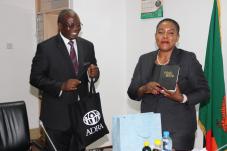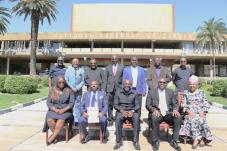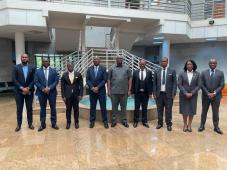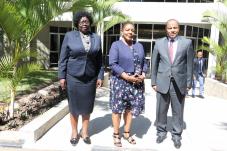- Home
- About Parliament
- Members
- Committees
- Publications
PARLIAMENTARIANS TAKE ACTION ON CHILD, EARLY AND FORCED MARRIAGE
The First Deputy Speaker, Hon Catherine Namugala, MP, has implored Members of Parliament to take keen interest in child, early and forced marriage issues as the law makers have a special mandate to protect children and women as well as influence relevant national institutions to place issues related to the rights of these vulnerable groups at the top of the government’s political and development agenda.
She has also called on all Zambians to help fight the scourge of child, early and forced marriage, a vice which she sadly said is still among the highest in the world and the vice had hindered the children from realising their full potential.
She noted that child marriage affects more girls than boys, further hindering them from realising their right to education, health, dignity, non-discrimination, quality life and had also perpetuated poverty.
She was speaking at the opening of a two day seminar for Parliamentarian organised by the National Assembly with support from the Inter-Parliamentary Union (IPU) on “child, early and forced marriage” on Saturday, 24th February, 2018, at Parliament Buildings.
Speaking at the same function, Hon Professor Nkandu Luo, Minister of Higher Education and Chairperson of the Zambia Women Parliamentarians Caucus (ZWPC) Honourable Prof Nkandu Luo noted that His Excellency the President of the Republic of Zambia, Mr Edgar Chagwa Lungu had acknowledged the severity of the situation hence government had put in place various interventions to address the challenge of child marriage and problems associated with women’s health and that of children and adolescents.
Professor Luo mentioned that government had priotised and committed itself to the 2016-2030 World Health Organisation (WHO) Global Strategy for Women’s Children’s and Adolescents’ Health. She said that, as members of the ZWPC, and Parliamentarians, they play a pivotal role in the effective implementation of the strategy and provision of national political leadership.
She was glad to note that the seminar would also endeavour to identify the most urgent issues to be addressed to raise awareness on sexual reproductive health among adolescents, as well as dedicate an in-depth session on child, early and forced marriage.
In addition, Hon Prof Nkandu Luo observed that Parliamentarians in attendance had been drawn from parliamentary committees and that the National Assembly had facilitated the creation of voluntary groups that were there to promote, among other issues, the welfare of women, children and adolescents. The groups included the Coalition of African Parliamentarians against HIV and AIDS (CAPAH), Parliamentary Caucus on Children (PCC) and the co-organisers of this seminar, the Zambia Women Parliamentarians Caucus (ZWPC)
Earlier, Clerk of The National Assembly of Zambia, Mrs Cecilia N Mbewe, mentioned that Zambia was facing a lot of challenges, among them, child marriage and early pregnancies. It is for this reason that the National Assembly of Zambia, in collaboration with the Inter-Parliamentary Union (IPU), had organised the seminar in order for Parliamentarians to take a leading role in fighting these vices associated with women’s and children’s health.
She further said, women and children constituted the majority of the vulnerable groups in most societies of the world including Zambia. Some of these vulnerable women and children were found in constituencies whose Members were present in the seminar.
And speaking on behalf of Mr Martin Chungong, Secretary General of the IPU, Mr Enico Iaia said the seminar represented a continuation of a strong partnership between the National Assembly of Zambia and the IPU which was crowned in 2016 when the National Assembly hosted the 134th IPU Assembly in Lusaka. The decisions made at that Assembly continue to shape and inform the IPU activities at various levels, in particular, in relation to empowerment and representation of young people in politics.
Mr Iaia also said that the IPU was counting a lot on the seminar to provide the needed momentum for the National Assembly to take robust, coordinated action to tackle child, early and forced marriage and remained committed to assisting the National Assembly of Zambia. He was confident that the Parliamentarians would find the seminar useful.
Mr Iaia was also hopeful that the discussions would lead to conclusions, recommendations and innovative ways in which Parliamentarians could contribute effectively to building an environment conducive for stopping child, early and forced marriage.
The seminar was attended by most women Parliamentarians with support from some male Parliamentarians. Resource persons were drawn from the World Health Organisation (WHO) and the United Nations Programme on HIV/AIDS (UNAIDS).





